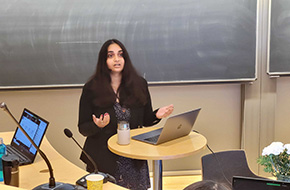Bhavana Vaddadi successfully defends PhD

Congratulations Dr. Bhavana Vaddadi for successfully defending your PhD! She is the first person to start and complete their doctorate entirely here at ITRL.
Bhavana wrote her thesis on Mobility as a Service and investigated the importance of taking the “system-level perspective” to evaluate innovative MaaS solutions. Bhavana evaluated two small scale MaaS trials ( Scania Go & Mistra SAMS Living Labs 2 ) from the individual, organisational and societal perspectives separately and in an integrated manner by constructing the system-level framework to understand the possible challenges and barriers that could arise when full-scale MaaS operations become a reality.

There are a few main takeaways from the thesis:
- Users in both the small-scale trials held high expectations that the MaaS services would help them adopt more sustainable travel and living practices. While the intension was to encourage users to shift from personal cars to shared modes of transport, in both trials many users stated that driving a personal car is a more reliable, flexible, and convenient option for daily commute. Many stated reasons such as workplace rules & regulations, lack of proper information in the app, availability of the services at the work locations. These observations gave a better insight into the possible barriers and challenges users as well as organisations could face when full-scale MaaS systems are realised.
- The system-level perspective was able to shed light on the relationships between individual, organisational and societal levels hence providing an understanding of the potential barriers in the decision-making processes of MaaS stakeholders. For authorities, companies, providers that offers these types of services, the evaluation of MaaS through a system level perspective could be an important follow-up tool for understanding the possible effects of upscaling.
- In order to quantifiably assess the full-scale implications of MaaS, availability of data is crucial. With support of good data for the Key Performance Indicators chosen, the system-level framework can be flexible enough to be used in evaluations of MaaS in other contexts. With the availability of data, the system-level framework could be used as a foundation for modelling and simulation methods such as MatSIM, system-dynamics models.
Tell us about an exciting moment during your PhD time!
“I think my first ever conference was the one of the most exciting and memorable moment for me. I attended the NECTAR conference in 2019 in Helsinki. It was my first-time rubbing shoulders with some of the most accomplished researchers in my field. It was such a rush of excitement and joy for me to present the first few steps of my research to such an audience.”
What kept you motivated during these years?
“This is a super difficult question to answer. I will not sugar coat it. It was difficult to keep my motivations up all throughout my journey. There were of course several ups and downs as all journeys do. However, I always remind myself, where I came from, what I started with and how far I have come today. It instantly helps me gain back my confidence and reminds me of the capabilities I possess. Additionally, as I reflect upon this question, I realise how instrumental my supervisors and colleagues have been throughout my journey in keeping me motivated, especially on bad days. Not sure I would have made it this far without their constant support.”
And lastly, what will you do next?
“I will be continuing on with my projects such as SEAMLESS and maybe a few more if I am lucky as a Researcher at ITRL. It will be very interesting to see how I can continue to study and modify the system level perspective further in other MaaS contexts as well as other smart mobility systems. I am sure a lot of interesting research lies ahead of me!”

